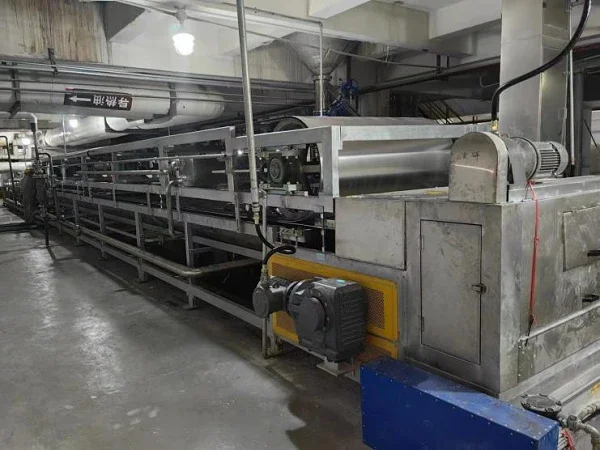Sulfur is an essential element widely used across various industries, from fertilizers to industrial applications. Among its many uses, sulfur granulation is a critical process that ensures sulfur can be efficiently handled, stored, and applied, especially in agricultural and industrial settings. The sulfur granulation process involves transforming molten sulfur into solid, granular form, allowing it to be used effectively in numerous sectors. This article Little Sky explores the advantages of sulfur granulation, shedding light on why it is an indispensable part of the sulfur production chain.
What is Sulfur Granulation?

Sulfur granulation is a process that involves converting molten sulfur into solid granules. The sulfur, typically in its liquid form due to heating, is carefully cooled and solidified to form small, uniform granules. These granules can then be used in various applications, such as fertilizers, industrial products, and chemical manufacturing.
In the sulfur granulation process, molten sulfur is subjected to a cooling process in which it is mechanically or thermally treated to form solid granules. The process is designed to produce sulfur in a convenient form that is easier to handle, transport, and store compared to bulk sulfur. The granules are typically spherical and uniform in size, which makes them ideal for use in applications that require precise dosing, controlled release, and stable performance.
The primary goal of sulfur granulation is to provide a reliable and practical form of sulfur that can be easily integrated into manufacturing and industrial processes. The process offers an efficient and cost-effective way to produce sulfur products, ensuring consistent quality and uniform size, which is crucial for many industries that rely on sulfur-based materials.
Advantages of Sulfur Granulation
The sulfur granulation process offers numerous advantages over other methods of handling and using sulfur. The ability to produce uniform, high-quality granules makes sulfur granulation ideal for use in many industrial applications. Below are some of the key benefits of granulating sulfur:
1. Improved Handling and Storage
One of the main benefits of sulfur granulation is the improvement in handling and storage. Granulated sulfur is easier to handle and transport than molten or powdered sulfur. The uniform size and shape of the granules make them easier to package, stack, and store. The solid form of the sulfur also eliminates the risk of leaks, spills, or contamination, which is a common concern when handling molten sulfur. Additionally, sulfur granules are less prone to clumping, a common problem with bulk sulfur. The granular form ensures that sulfur remains free-flowing and can be easily mixed or blended with other materials.
2. Controlled Release in Fertilizers
In the agricultural industry, sulfur granules are prized for their ability to provide a controlled release of sulfur to plants. Sulfur is an essential nutrient that plays a key role in the production of proteins and enzymes within plants. However, if too much sulfur is released at once, it can be harmful to plants, leading to nutrient imbalances or environmental contamination. Sulfur granulation allows for a slow and controlled release of sulfur into the soil, ensuring that plants receive a steady, sustained supply of this essential nutrient over time. This helps improve crop yield and quality while minimizing the environmental impact of over-fertilization. Granulated sulfur products are therefore widely used in the production of fertilizers for crops like corn, wheat, rice, and cotton.
3. Consistent Quality and Size Distribution
The sulfur granulation process ensures that sulfur granules are produced with a consistent size and shape. This consistency is crucial in many applications, especially in industries like fertilizers and chemical manufacturing. For example, in fertilizer applications, uniform granules allow for precise application rates, ensuring that the correct amount of sulfur is delivered to the soil. Additionally, consistent granule size improves the handling and processing of sulfur products. Whether used in agricultural applications or chemical manufacturing, uniform granules allow for more efficient and reliable performance.
4. Versatility in Industrial Applications
Granulated sulfur is highly versatile and used in a wide range of industrial applications. In addition to being a key ingredient in fertilizers, sulfur granules are used in the production of sulfuric acid, rubber vulcanization, and even in certain chemical reactions in the petrochemical industry. Granulated sulfur is also used in metal refining processes and as a component in mining operationsThe ability to handle sulfur in a granular form makes it much easier to incorporate into various industrial processes, reducing waste and improving efficiency.
The sulfur granulation process is an essential manufacturing method in a wide range of industries. From fertilizer production to sulfuric acid manufacturing, granulated sulfur provides a versatile, efficient, and controlled solution for sulfur application. By transforming molten sulfur into easy-to-handle granules, the granulation process not only improves handling and storage but also ensures controlled release for optimal performance in various industrial applications. As industries continue to rely on sulfur-based products for agricultural, chemical, and industrial purposes, the importance of sulfur granulation will continue to grow. By offering consistent quality, improved handling, and environmental benefits, sulfur granulation is a key process in modern manufacturing, helping industries meet the growing demand for sulfur products in a sustainable and efficient manner.
https://www.th-littlesky.com/Sulfur-Granulator
www.th-littlesky.com
Little Sky Mechanical Engineering Kabushiki Kaisha
More Stories
Key Features to Look for in a Single-Acting Scotch Yoke Pneumatic Actuator + Bevel Gear
Dingshengzun Launches Comprehensive Onshore Oilfield Equipment Solutions for Industry
ATLAS COPCO 3002600320 PACKAGING KIT